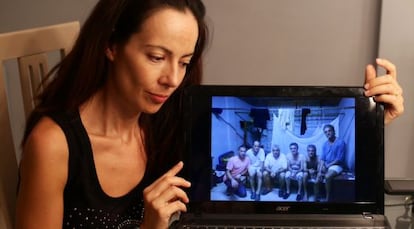Six haulage contractors stuck in Sierra Leone hopeful of solution
Truckers have been trapped in country for 10 months without passports

For the last 10 months, six Spanish haulage contractors have been unable to leave Freetown, Sierra Leone, because the authorities in the West African country are holding their passports.
The men, Luis María Huerta, José Mocholí, Enrique Mocholí, Ramiro González, Antonio Valenzuela and Juan Carlos Gafo, all traveled to Sierra Leone in January on behalf of Valencia-based firm Aznar Quarrying Logistics, from which they hired vehicles for 370 dollars a day to haul earth and rocks from an open-cast mine. "The firm contacted me, saying it wanted to recruit between 40 and 50 tons of haulage, around 200 trucks, and a lot of workers," says 44-year-old José Mocholí from the hotel in Freetown that has become his virtual prison. He says that faced with a sharp downturn in the haulage business in Spain, and with mounting debts, he and his brother, along with Huerta, accepted the job. Mocholí took out a loan of 50,000 euros to buy two trucks and take them to Sierra Leone.
The Valencian firm had set up a company with a local partner in Sierra Leone: Aznar Quarrying Logistics supplied the trucks, and the local partner would take care of the mining operation.
"When we got to the country, we handed over our passports so that they could issue our visas and work permits," explains Mocholí. "We had already paid 450 euros in Spain. Since then, we haven't seen our passports. It took 55 days to get the trucks out of customs because the companies couldn't agree on who should pay the taxes," he says.
I had to pay 450 euros to get my passport back to the local partner"
In the end, Mocholí and his colleagues paid the import duty on the vehicles, only to discover the trucks had been stripped. They then paid for replacements, and without their passports or work permits, got the job underway. After six weeks, Aznar Quarrying Logistics sent a lawyer to Freetown to issue a lawsuit against its local partner. The affair was settled by a local court, which also ordered the men to stop working. They nevertheless carried on, while at the same time trying to recover their passports.
One of the six, Prieto, managed to leave in May. "I had to pay 450 euros to get my passport back to the local partner. He had it delivered to the departure area of the airport. I guess I have lost around 115,000 euros as a result of all this," he says.
The five remaining drivers say that Aznar Quarrying Logistics has refused to help them. Josefa Aznar, one of the firm's administrators, refuses to comment on the situation. On Wednesday María del Carmen Crespo, wife of Huerta, called on Prime Minister Mariano Rajoy to step in to resolve the situation. Now is the time for "the embassy, the ministry and the prime minister [to intervene], because they are Spaniards and they are there stranded," she told news agency Efe.
The Spanish Foreign Ministry says the ambassador to Sierra Leone is going to meet the men. On its website it warns that the West African nation "has recently emerged from conflict" but says nothing about the risk of resolving legal or commercial disputes.
The five men say their families have been sending them money, but can no longer afford to do so. "My sons and I are unemployed and we simply can't find any more money," says Crespo.
Although he made it out of the country, Prieto says he is now unable to repay the loans he took out, and is so desperate that he would be prepared to undertake a similar project: "I'd go to the moon if there was work there."
Speaking this week to Efe, the men said they were confident the Spanish ambassador will be able to sort out their problems. The wife of José Mocholí, Eva Báguena, also told Efe that their situation was "exasperating." "They are always being told that tomorrow they'll have their papers, but they never arrive," she said.
Tu suscripción se está usando en otro dispositivo
¿Quieres añadir otro usuario a tu suscripción?
Si continúas leyendo en este dispositivo, no se podrá leer en el otro.
FlechaTu suscripción se está usando en otro dispositivo y solo puedes acceder a EL PAÍS desde un dispositivo a la vez.
Si quieres compartir tu cuenta, cambia tu suscripción a la modalidad Premium, así podrás añadir otro usuario. Cada uno accederá con su propia cuenta de email, lo que os permitirá personalizar vuestra experiencia en EL PAÍS.
¿Tienes una suscripción de empresa? Accede aquí para contratar más cuentas.
En el caso de no saber quién está usando tu cuenta, te recomendamos cambiar tu contraseña aquí.
Si decides continuar compartiendo tu cuenta, este mensaje se mostrará en tu dispositivo y en el de la otra persona que está usando tu cuenta de forma indefinida, afectando a tu experiencia de lectura. Puedes consultar aquí los términos y condiciones de la suscripción digital.








































